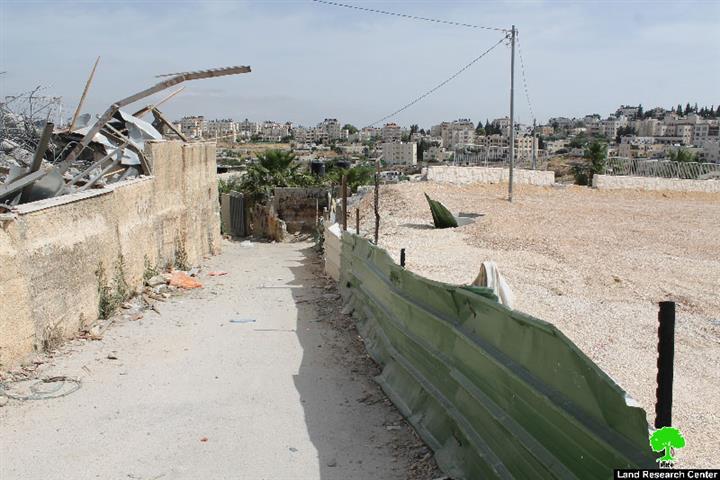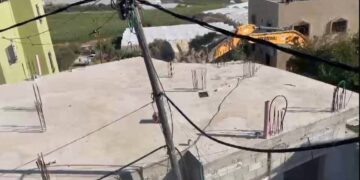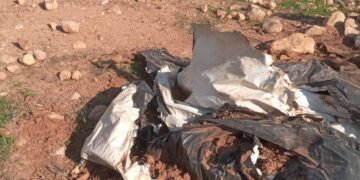It is well known that the Israeli occupation conducts all destruction forms on Palestinian buildings and constructions for the favor of colonial projects and plans. Israel considers areas classified "C" according to Oslo Accords as colonial reserve areas to expand on.
On May 18, 2016, dozers of Israel's occupation municipality demolished a residence in the Jerusalem town of Shu'fat for the favor of opening the bypass road number 20, which travels through the lands of Shu'fat and Beit Hanina towns to link the colonies of Ramot and Pisgat Ze'ev.
The demolished residence (150m2) is reported to be belonging to citizen Rajeh Hawareen. The house is home to Rajeh and his five member family including a minor.
Rajeh told Land Research Center the following:
" I built the house in 2001 after the dozers of Israeli Occupation Forces demolished my residence that was still under construction in the area of Tal Al-Foul on the claim of unlicensed construction. My neighbors and I bought the plot on which I built the house. The purchase was done after making sure that construction is allowed on such lands. Israel's municipality informed me that the land is classified green; meaning that construction is allowed on such classifications. I built the house before applying for a building permit because I was in hurry to shelter my family. After the construction was done, I applied to obtain a building permit from the municipality through architect Akram Yaghmour, who informed me that things were going well at time"
In 2002, the municipality informed the office of architect Akram Yaghmour that my license application was rejected on the claim that the area in which the house was built is to be re-classified. Since that time until 2012, I did not receive any notice or warnings from the municipality.
In 2012, I received my first notice from the occupation's municipality that ordered the house demolished on the claim of unlicensed construction and that a road will be opened in the area. I immediately sought attorney Sami Irsheid to follow up on the case. One year later, construction works on the road started.
On January 2016, a force from Israel Police and a dozer arrived to the town and demolished the residence of Kifaya Al-Rishiq, which is three meters away from my house. After I saw the humiliation Al-Rishiq family underwent, I evicted my house, fearing that the municipality will come and demolish my place.
The court of Israel's occupation municipality made a decision on February 2016 to evict my residence before April 30, 2016 in order to complete the opening of the bypass road. On February 2016, the contractor that works on the road applied for the court to draw the demolition date closer, which is what the court agreed on. As a result, the demolition was approved on February 18".
Photo 1: the house before demolition
Photos 2-3: views of the demolition operation
Photos 4-5: the bypass road number 20
Photo 6: House owner, Rajeh Huwareen
Land Research Center LRC sees that demolitions contradict with all of the International conventions and Humanitarian laws including:
- Article 17 of the (1948) Universal Declaration of Human Rights stating: “Everyone has the right to own property alone as well as in association with others. No one shall be arbitrarily deprived of his property.”
- Article 147 of the Fourth Geneva Convention of 1949 indicated that:
Extensive destruction and appropriation of property not justified by military necessity and carried out unlawfully and wantonly. is a grave breach of the Convention
- Section ‹G› of article 23 of the (1907) The Hague Conventions asserting: “In addition to the prohibitions provided by special Conventions, it is especially forbidden to destroy or seize the enemy's property, unless such destruction or seizure be imperatively demanded by the necessities of war.”
- Article 53 of the Geneva Fourth Convention (1948) declaring: “Any destruction by the Occupying Power of real or personal property belonging individually or collectively to private persons, or to the State, or to other public authorities, or to social or cooperative organizations, is prohibited, except where such destruction is rendered absolutely necessary by military operations.”
- Section 1, Article 11 of the International Covenant on Economic, Social and Cultural Rights (1966): “The States Parties to the present Covenant recognize the right of everyone to an adequate standard of living for himself and his family, including adequate food, clothing and housing, and to the continuous improvement of living conditions. The States Parties will take appropriate steps to ensure the realization of this right, recognizing to this effect the essential importance of international co-operation based on free consent."
Prepared by
The Land Research Center
LRC



















